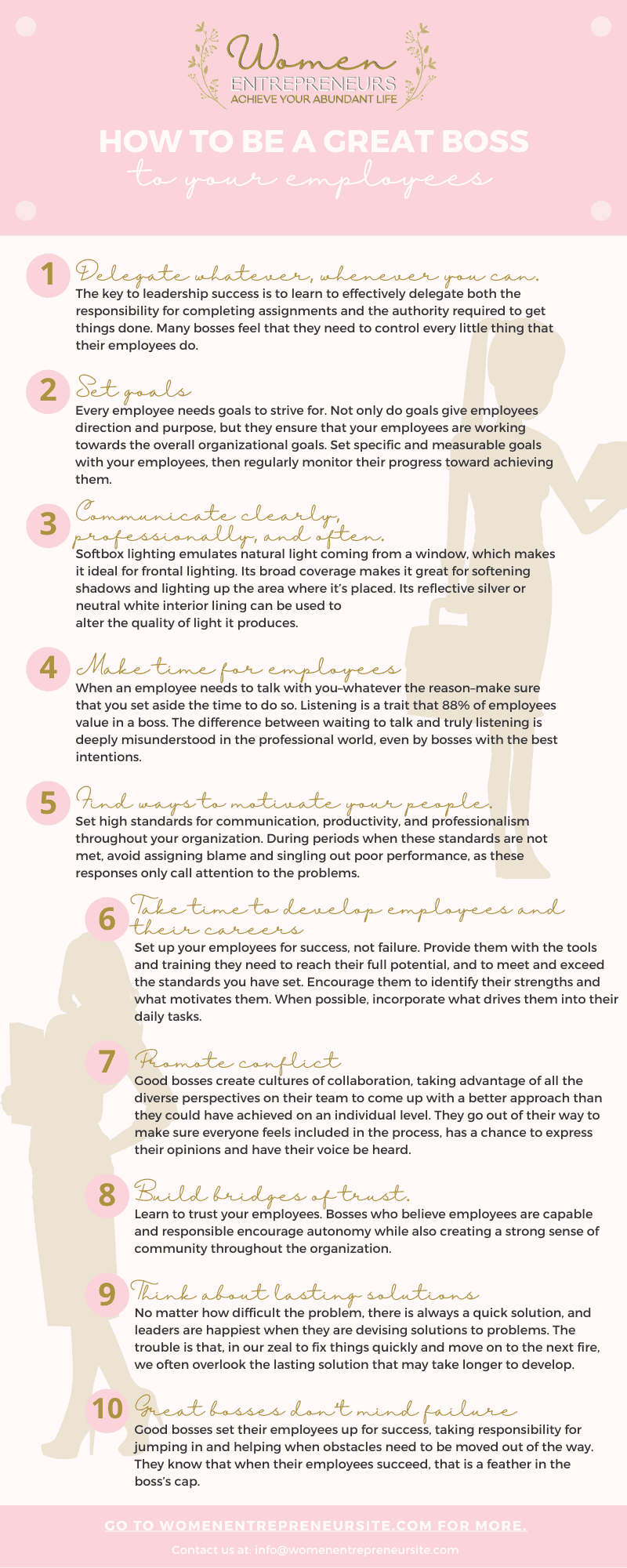In the realm of professional growth, there comes a pivotal moment for many individuals when the…
How to Be a Great Boss to Your Employees

People management is the last thing many entrepreneurs want to worry about (or do). It is important to go out there, fulfill customers, create outstanding products, and bring exciting new possibilities to your customers. It’s still your responsibility to be a great boss and manage your employees after that unless you’ve hired someone to do it for you.
The good news is you can make that job easier on yourself if you keep these 10 essential secrets in mind and your organization will certainly benefit from your efforts.
The Business Coach (Instant Success)
Utilizing methodologies created by Sugars and the business coaches at Action International, The Business Coach has empowered countless entrepreneurs globally to achieve their aspirations. Through this program, you will gain valuable knowledge in the following areas:
- Discover the fundamentals of business for both novice and seasoned entrepreneurs.
- Learn how to identify areas of concern, devise effective strategies, and track your progress.
- Unlock the key to genuine financial independence by establishing a thriving company that operates autonomously.
- Experience immediate and tangible outcomes with Instant Success, providing you with invaluable insights and practical guidance.
Find out what Instant Success can do for you today!
10 Tips on How to Be a Great Boss
1. Delegate whatever you can, whenever you can.
Successful management requires learning how to pass on both the responsibility for completing tasks and the authority needed to get things done. There are many great bosses who feel they must regulate everything their employees do. Calamity awaits. The more work you pass on to your employees, the more jobs you can accomplish, while building their self-confidence, leadership, and work skills.
2. Set goals
The objectives of each staff member should be a source of motivation. Objectives not only provide employees with direction and function, but they also ensure that your employees are working towards the organization’s overall goals. Make sure your staff members have specific and quantifiable goals, and monitor their progress toward achieving them on a regular basis.
3. Communicate clearly, professionally, and often.
Managers interact in an inadequate manner far too often. It is often difficult for local business owners and executives to keep their staff updated on the latest business information. To ensure workers get the information they need quickly and efficiently, you should make every effort to provide them with the information they need.
4. Make time for employees
Management is primarily a people task. Make sure you reserve the time for a staff member to speak with you– whatever the reason may be. 88% of workers value an employer who pays attention to them. Yet only 60% of employees say their supervisors pay attention to them. Even the best-intentioned employers misinterpret the difference between waiting to chat and also really listening. Focus on the person standing before you and put aside your work for a moment. You do not lose any points by giving someone your full attention.
5. Find ways to motivate your people.
Establish high standards for communication, productivity, and expertise throughout your organization. It is important to avoid blaming and selecting poor performance when these standards aren’t met, as these actions only compound the problem. You shouldn’t lower your standards, but instead take on obstacles as a team with your employees. Work with your workers to identify obstructing issues, focus on feasible solutions, and strive to exceed expectations.
6. Take time to develop employees and their careers.
Don’t let your employees fail, set them up for success. Assist them in reaching their full potential by giving them the tools and training they need. Encourage them to determine their stamina and what inspires them. Whenever possible, find out what motivates them in their day-to-day activities.
7. Promote conflict.
They benefit from the diverse viewpoints of their group to create a far better strategy than they might have come up with individually. Their goal is to ensure that everyone feels included in the process, has the opportunity to share their views, and has their voice heard. In addition to doing all these things, great bosses cultivate a work environment that promotes and sustains effective conflict.
A terrific employer may not desire conflict on the face of it! It is important to keep in mind, however, that not all types of problems are created equal.
- Destructive conflict is fueled by ego, politics, and competition.
- Productive conflict is an unfiltered, passionate discussion regarding an issue that is important to the success of the team.
8. Build bridges of trust.
Employees need to be trusted. Staff members with a sense of community and autonomy are encouraged by employers who believe they are capable and accountable. A positive, risk-free working environment that is open, sincere, and two-way must be created in order to create a trust fund. With a productive, risk-free, and supportive environment, your workers are certain to meet or exceed organizational objectives.
9. Think about lasting solutions
Leaders are happiest when they create solutions to problems, no matter how tough the problem might seem. Usually, we forget the lasting solution that can take longer to create as we are eager to deal with issues swiftly and move on to the next fire. It’s even more enjoyable to be a fireman, but next time you have a problem in your company, address the root cause rather than simply the symptoms.
10. Great bosses don’t mind failure.
A great employer sets up their employees for success by stepping in when challenges arise and also helping when necessary. When their workers succeed, their bosses are delighted. However, great bosses recognize that discovering creative ideas or assuming outside packages inherently involves one important point that many experts fear: failure. When you’re trying something new, it’s impossible to expect everything to go smoothly the first time! Or the 2nd time, or the third time.
Final Thoughts
The business of running a company is without a doubt a serious one. There must be products/services offered and supplied, as well as money to be made. A successful boss makes his or her company a fun place to work despite the gravity of these responsibilities. A company that strives and plays hard to develop a dedicated, enthusiastic workforce does not hire sick workers, work late, or leave early, but rather hires workers who look for every reason to go home early or arrive late.






